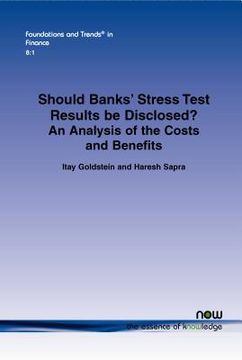Compartir
Should Banks Stress Test Results Be Disclosed?: An Analysis of the Costs and Benefits (en Inglés)
Itay Goldstein
(Autor)
·
Haresh Sapra
(Autor)
·
Now Publishers
· Tapa Blanda
Should Banks Stress Test Results Be Disclosed?: An Analysis of the Costs and Benefits (en Inglés) - Goldstein, Itay ; Sapra, Haresh
$ 87.410
$ 121.400
Ahorras: $ 33.990
Elige la lista en la que quieres agregar tu producto o crea una nueva lista
✓ Producto agregado correctamente a la lista de deseos.
Ir a Mis Listas
Origen: Estados Unidos
(Costos de importación incluídos en el precio)
Se enviará desde nuestra bodega entre el
Jueves 08 de Agosto y el
Martes 20 de Agosto.
Lo recibirás en cualquier lugar de Chile entre 1 y 3 días hábiles luego del envío.
Reseña del libro "Should Banks Stress Test Results Be Disclosed?: An Analysis of the Costs and Benefits (en Inglés)"
Should Banks' Stress Test Results be Disclosed? An Analysis of the Costs and Benefits reviews the theoretical literature on disclosure, tying it to the recent policy debate on whether stress-test results should be disclosed. The authors review the nature of stress tests required by the Dodd-Frank act and conducted by the Federal Reserve, an important aspect of which is the public disclosure of the results. Then, it compares the arguments for and against the disclosure of banks' stress test results. While the rationale for disclosing stress test results may seem intuitive in the wake of the financial crisis, some argue that disclosing these results may actually have negative unintended consequences. Using insights from recent theoretical models, the authors provide a framework for understanding these negative unintended consequences. The authors argue that the benefits of disclosing stress-test results are clear: stress tests may uncover unique information about banks allowing both bank supervisors and market participants to exercise discipline on the bank's behavior. But because banks operate in second-best environments that are prone to externalities, there are inherent costs associated with such disclosures, and proper understanding of the sources of these costs would better inform the debate and guide regulators when designing stress tests and handling the disclosures. Should Banks' Stress Test Results be Disclosed? An Analysis of the Costs and Benefits is organized as follows. After a brief introduction, Section 2 reviews the nature of stress tests and considers the unique information they provide to outsiders. Section 3 explains how disclosures of stress tests could provide regulatory and market discipline, and the positive impact such discipline may have on economic efficiency. The main section, Section 4, provides an in-depth review of the possible costs of disclosure. Building on the previous section, Section 5 shows that there are non-trivial trade-offs associated with disclosure of stress-test result, and provides several policy recommendations for regulators regarding test design and disclosure of results. Section 6 concludes by reiterating the need for the development of a framework that captures the combined effects on all banks, and the challenge this poses for academics and policy makers.
- 0% (0)
- 0% (0)
- 0% (0)
- 0% (0)
- 0% (0)
Todos los libros de nuestro catálogo son Originales.
El libro está escrito en Inglés.
La encuadernación de esta edición es Tapa Blanda.
✓ Producto agregado correctamente al carro, Ir a Pagar.

